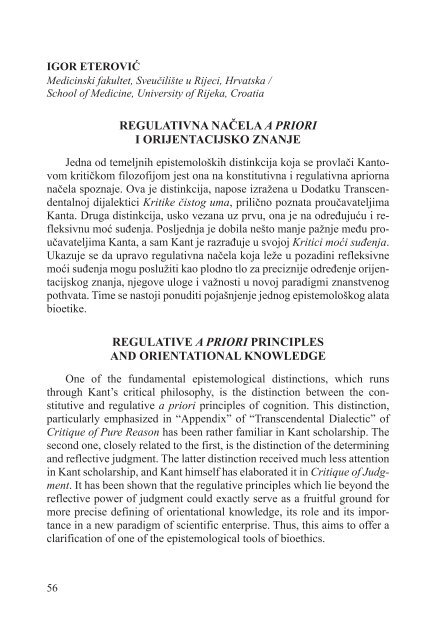Programska knjižnica 9. Lošinjskih dana bioetike - Hrvatsko ...
Programska knjižnica 9. Lošinjskih dana bioetike - Hrvatsko ...
Programska knjižnica 9. Lošinjskih dana bioetike - Hrvatsko ...
You also want an ePaper? Increase the reach of your titles
YUMPU automatically turns print PDFs into web optimized ePapers that Google loves.
IGOR ETEROVIĆ<br />
Medicinski fakultet, Sveučilište u Rijeci, Hrvatska /<br />
School of Medicine, University of Rijeka, Croatia<br />
REGULATIVNA NAČELA A PRIORI<br />
I ORIJENTACIJSKO ZNANJE<br />
Jedna od temeljnih epistemoloških distinkcija koja se provlači Kantovom<br />
kritičkom filozofijom jest ona na konstitutivna i regulativna apriorna<br />
načela spoznaje. Ova je distinkcija, napose izražena u Dodatku Transcendentalnoj<br />
dijalektici Kritike čistog uma, prilično poznata proučavateljima<br />
Kanta. Druga distinkcija, usko vezana uz prvu, ona je na određujuću i refleksivnu<br />
moć suđenja. Posljednja je dobila nešto manje pažnje među proučavateljima<br />
Kanta, a sam Kant je razrađuje u svojoj Kritici moći suđenja.<br />
Ukazuje se da upravo regulativna načela koja leže u pozadini refleksivne<br />
moći suđenja mogu poslužiti kao plodno tlo za preciznije određenje orijentacijskog<br />
znanja, njegove uloge i važnosti u novoj paradigmi znanstvenog<br />
pothvata. Time se nastoji ponuditi pojašnjenje jednog epistemološkog alata<br />
<strong>bioetike</strong>.<br />
REGULATIVE A PRIORI PRINCIPLES<br />
AND ORIENTATIONAL KNOWLEDGE<br />
One of the fundamental epistemological distinctions, which runs<br />
through Kant’s critical philosophy, is the distinction between the constitutive<br />
and regulative a priori principles of cognition. This distinction,<br />
particularly emphasized in “Appendix” of “Transcendental Dialectic” of<br />
Critique of Pure Reason has been rather familiar in Kant scholarship. The<br />
second one, closely related to the first, is the distinction of the determining<br />
and reflective judgment. The latter distinction received much less attention<br />
in Kant scholarship, and Kant himself has elaborated it in Critique of Judgment.<br />
It has been shown that the regulative principles which lie beyond the<br />
reflective power of judgment could exactly serve as a fruitful ground for<br />
more precise defining of orientational knowledge, its role and its importance<br />
in a new paradigm of scientific enterprise. Thus, this aims to offer a<br />
clarification of one of the epistemological tools of bioethics.<br />
56

















